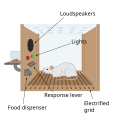Classical conditioning (also respondent conditioning and Pavlovian conditioning) is a behavioral procedure in which a biologically potent stimulus (e...
66 KB (8,709 words) - 18:26, 3 December 2024
Operant conditioning, also called instrumental conditioning, is a learning process where voluntary behaviors are modified by association with the addition...
68 KB (8,832 words) - 07:16, 9 December 2024
Eyeblink conditioning, classical conditioning involving pairing of a stimulus with an eyeblink-eliciting stimulus Fear conditioning, classical conditioning involving...
2 KB (320 words) - 14:46, 18 July 2024
can be used to study both operant conditioning and classical conditioning. Skinner created the operant conditioning chamber as a variation of the puzzle...
16 KB (1,804 words) - 07:00, 30 August 2024
Ivan Pavlov (section Classical conditioning)
experimental neurologist and physiologist known for his discovery of classical conditioning through his experiments with dogs. Pavlov was born the first of...
38 KB (4,135 words) - 14:36, 22 December 2024
associations is the basis for learning. This learning is seen in classical and operant conditioning.[citation needed] Edward Thorndike did research in this area...
18 KB (2,446 words) - 08:14, 16 October 2024
In classical conditioning, second-order conditioning or higher-order conditioning is a form of learning in which a stimulus is first made meaningful or...
5 KB (668 words) - 16:20, 16 April 2023
Bedwetting alarm (section Classical conditioning)
This suggests that the conditioning treatment may follow the operant avoidance conditioning rather than the classical conditioning pattern. In addition...
12 KB (1,718 words) - 00:07, 14 July 2024
Learning (section Classical conditioning)
example, learning may occur as a result of habituation, or classical conditioning, operant conditioning or as a result of more complex activities such as play...
79 KB (9,982 words) - 08:55, 10 December 2024
study that mid-20th century psychologists interpret as evidence of classical conditioning in humans. The study is also claimed to be an example of stimulus...
24 KB (2,916 words) - 07:34, 10 December 2024
previous to learning, which may or may not be zero). In classical conditioning, when a conditioned stimulus is presented alone, so that it no longer predicts...
35 KB (4,388 words) - 18:33, 29 November 2024
term conditioned emotional response (CER) can refer to a specific learned behavior or a procedure commonly used in classical or Pavlovian conditioning research...
6 KB (901 words) - 22:47, 16 March 2023
Latent learning (section Classical conditioning)
the other learning theories such as operant conditioning or classical conditioning. Classical conditioning is when an animal eventually subconsciously...
15 KB (2,125 words) - 21:19, 27 March 2024
hormone, following the initial stressor. Classical conditioning Extinction (psychology) Eyeblink conditioning Fear processing in the brain Infralimbic...
30 KB (3,770 words) - 13:26, 8 July 2024
Behaviorism (section Operant conditioning)
conditioning plays the largest role in discussions of behavioral mechanisms, respondent conditioning (also called Pavlovian or classical conditioning)...
89 KB (10,514 words) - 05:20, 14 December 2024
Claustrophobia (section Classical conditioning)
many factors, including a reduction in the size of the amygdala, classical conditioning, or a genetic predisposition to fear small spaces. One study indicates...
28 KB (3,850 words) - 15:29, 18 December 2024
Social conditioning is the sociological process of training individuals in a society to respond in a manner generally approved by the society in general...
14 KB (1,879 words) - 03:10, 5 November 2024
Dog training (section Classical conditioning)
receives attention. Classical conditioning (or Pavlovian conditioning) is a form of learning in which one stimulus, the conditioned stimulus, comes to...
92 KB (10,609 words) - 03:04, 12 December 2024
Phobia (section Classical conditioning)
fearful stimuli occurs through fear conditioning. Like classical conditioning, the amygdala learns to associate a conditioned stimulus with a negative or avoidant...
71 KB (8,201 words) - 07:18, 28 November 2024
Prenatal memory (section Classical conditioning)
They are: classical conditioning, habituation and exposure learning. Classical conditioning is described as the pairing of a conditioned stimulus (CS)...
38 KB (5,011 words) - 11:50, 22 August 2024
principles developed by such research, in particular operant conditioning and classical conditioning. Behavior analysis adopts the viewpoint of radical behaviorism...
88 KB (10,192 words) - 19:02, 22 December 2024
are presented is an important factor in all forms of classical conditioning. Forward conditioning describes a presentation format in which the CS precedes...
20 KB (2,960 words) - 03:17, 12 January 2024
motor behavior the precedes the presenting of food. So classical conditioning and operant conditioning are very much related. Positive emotion stimuli will...
36 KB (4,664 words) - 17:08, 15 February 2024
liberalism Classical conditioning, a kind of learning that occurs when a conditioned stimulus is paired with an unconditioned stimulus Classical time control...
3 KB (484 words) - 12:56, 25 July 2024
Kicman P, Lisińska N (2017). "How Classical Conditioning Shapes Placebo Analgesia: Hidden versus Open Conditioning". Pain Medicine. 19 (6): 1156–1169...
14 KB (1,839 words) - 10:38, 12 January 2024
("R-W") is a model of classical conditioning, in which learning is conceptualized in terms of associations between conditioned (CS) and unconditioned...
12 KB (1,803 words) - 22:41, 27 November 2024
the form of classical conditioning (Pavlovian conditioning) and operant conditioning (instrumental conditioning). In classical conditioning, a reward can...
105 KB (12,986 words) - 04:52, 2 December 2024
reproductive technology, sleep-learning, psychological manipulation and classical conditioning that are combined to make a dystopian society which is challenged...
78 KB (9,874 words) - 02:01, 23 December 2024
W. (1978), "Review of Classical-Operant Conditioning, Parameter by Parameter", Classical Conditioning and Operant Conditioning, New York, NY: Springer...
19 KB (2,592 words) - 10:01, 22 June 2024
Counterconditioning (redirect from Counter conditioning)
counter conditioning. They explain the differences between classical conditioning and counter conditioning and also explain how counter conditioning works...
5 KB (648 words) - 19:45, 14 March 2022











